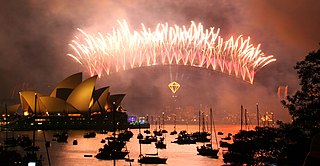
Fireworks are a class of low explosive pyrotechnic devices used for aesthetic and entertainment purposes. They are most commonly used in fireworks displays, combining a large number of devices in an outdoor setting. Such displays are the focal point of many cultural and religious celebrations, though mismanagement could lead to fireworks accidents.

A skyrocket is a type of firework that uses a solid-fuel rocket to rise quickly into the sky; a bottle rocket is a small skyrocket. At the apex of its ascent, it is usual for a variety of effects to be emitted. Skyrockets use various stabilisation techniques to ensure the flight follows a predictable course, often a long stick attached to the side of the motor, but also including spin-stabilisation or fins.

In the Gregorian calendar, New Year's Eve, also known as Old Year's Day, is the evening or the entire day of the last day of the year, 31 December. In many countries, New Year's Eve is celebrated with dancing, eating, drinking, and watching or lighting fireworks. Some Christians attend a watchnight service. The celebrations generally go on past midnight into New Year's Day, 1 January.

A firecracker is a small explosive device primarily designed to produce a large amount of noise, especially in the form of a loud bang, usually for celebration or entertainment; any visual effect is incidental to this goal. They have fuses, and are wrapped in a heavy paper casing to contain the explosive compound. Firecrackers, along with fireworks, originated in China.

Independence Day, known colloquially as the Fourth of July, is a federal holiday in the United States commemorating the Declaration of Independence, which was ratified by the Second Continental Congress on July 4, 1776, establishing the United States of America.

Siġġiewi, also called by its title Città Ferdinand, is a city and a local council in the Southern Region of Malta. It is the third largest council in Malta by surface area, after Rabat and Mellieħa. Siġġiewi is situated on a plateau a few kilometers away from Mdina and 10 kilometres away from Valletta, the contemporary capital. It is the home of 8,721 inhabitants as of January 2019. Until several decades ago, almost all of the population was employed in the fields which surround the city. In 1993, the city adopted the motto Labore et Virtute.

Żurrieq is a town in the Southern Region of Malta. It is one of the oldest towns in the country, and it has a population of 11,823 inhabitants as of March 2014. Żurrieq is one of the 10 parishes to be documented in 1436 and it is dedicated to Saint Catherine. The island of Filfla is administratively a part of the town. The town stretches from Nigret to Ħal Far. In old times the town was had a border with Żejtun. The village of Qrendi used to be part of the parish of Żurrieq until 1618 when it was made into its own parish.

Gudja is a village in the Southern Region of Malta, with a population of 3,148 as of March 2017. The village is located on high grounds, south of Valletta. It is administered by the Gudja Local Council. A number of schools, clubs, public gardens and recreations places are found around the village.

Fireworks in England, Scotland and Wales are governed primarily by the Fireworks Regulations 2004, the Pyrotechnic Articles (Safety) Regulations 2015, and British Standards BS 7114 until 4/7/17 and BS-EN 15947-2015. In Northern Ireland, fireworks are governed by The Pyrotechnic Articles (Safety) Regulations 2015, and Explosives (Fireworks) Regulations (NI) 2002.

Qrendi is a village in the Southern Region of Malta, with a population of 3148 people as of October 2021. It is located close to Mqabba, Żurrieq and Siggiewi. Within its boundaries are two well-known Neolithic temples called Mnajdra and Ħaġar Qim. In this village two feasts are held annually. The feast of Our Lady of Lourdes is celebrated either on the last Sunday of June or on the first Sunday of July, with 15 August the titular feast of the Ascension of Our Lady. This feast is popularly known as the feast of Santa Maria.
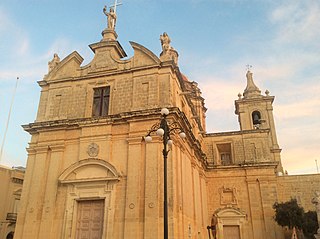
Mqabba is a town in the Southern Region of Malta. It has a traditional Maltese village layout, with a population of about 3,300 inhabitants. The focal point is the Parish Church of the Assumption, found at the core of the village. It has two band clubs, a number of gardens and a list of national monuments.

A Judas' belt, sometimes called Judah's belt, is a type of firecracker that produces multiple explosions. It is one of the most popular firecrackers in the Philippines during New Year's Eve celebrations.
Malta is the country with the most holidays in the European Union. Since 2020, any holidays falling on Saturdays or Sundays add an extra day to the workers' leave pool, reverting to the pre 2005 system.
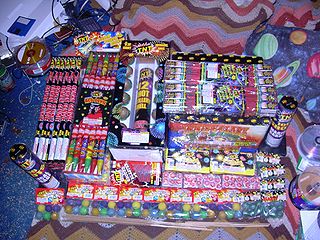
Consumer fireworks are fireworks sold for use by the general public. They are generally weaker in explosive power than the fireworks used in professional displays.
The St. Catherine Band Club, or Socjeta Muzikali Santa Katarina, is one of the two bands in Zurrieq, Malta. In 1864 the band was created from an orchestra known in Italian as La Filarmonica del Zurrico. In 1944 the bandmaster was Espedito Deguara, a well known musician in Malta.

In the small Mediterranean island nation of Malta the predominant religion is Roman Catholicism.

Sydney New Year's Eve is an annual New Year's Eve fireworks event in Sydney, New South Wales, Australia. The event currently consists of two fireworks shows, with an evening display known as the "Family Fireworks" held at 9:00 p.m. AEDT, and the main "Midnight Fireworks" held at 12:00 a.m. Fireworks are launched from barges in Port Jackson, as well as nearby landmarks such as the Sydney Opera House, and the Sydney Harbour Bridge, which serves as the main focal point of the show via lighting and pyrotechnic effects.

The New Year's Eve festivities in London, England, have regularly consisted of a midnight fireworks show. The focal point of the festivities are the South Bank, where the chimes of Big Ben at midnight signify the arrival of the new year, and pyrotechnics are launched from barges along the River Thames and from the London Eye observation wheel.
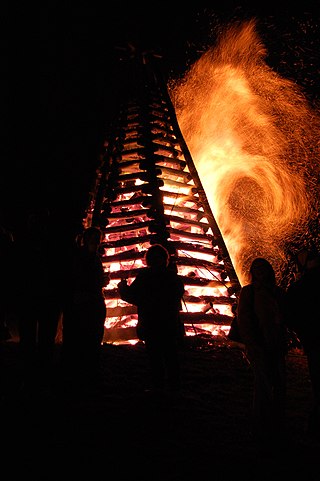
Bonfire Night is a name given to various annual events characterised by bonfires and fireworks. The event celebrates different traditions on different dates, depending on the country. Some of the most popular instances include Guy Fawkes Night in Great Britain, which is also celebrated in some Commonwealth countries; Northern Ireland's Eleventh Night, and 5 November in Newfoundland and Labrador. In various parts of Ireland, Bonfire Nights are held on Saint John's Eve, Bealtaine eve and Halloween. Due to the Thanksgiving Act, up until 1859 celebration of Guy Fawkes Night in the UK was legally mandated, which evolved into the Bonfire Night of today.
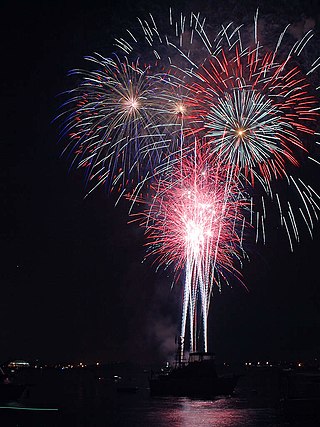
Fireworks policy in the United States can be different in each jurisdiction.




















